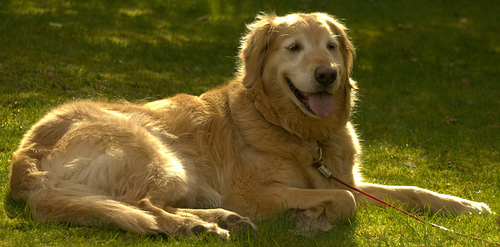by David Bear
Originally bred to hunt in 1800s England, the golden retriever has retained much of its natural curiosity and hunting behaviors. The breed has maintained its standing in the top ten most popular dog breeds in the US partly because of the dog’s gentle nature, fierce loyalty and friendly personality. They’re the quintessential family pet due to their patience with children.
The female golden weighs approximately 55-65 pounds, and stands a couple of inches shorter than her male counterpart, who stands about 24 inches at the shoulder, and weighs in at 65-75 pounds. Females tend to have smaller, more delicately-shaped heads than males. They come in a range of colors, from deep coppery auburn to light cream. Their coats also differ in appearance. Field goldens, or hunting goldens, are more likely to be darker and sleeker than show goldens, whose honey-colored coats are thick and fluffy. Goldens have two coats: their top coats are hardy and water-repellent, while their undercoats are thick and dense. These dogs shed most of their undercoat in the spring, and grow it in preparation for the chill of winter. Regular grooming can help control excessive shedding. Their ears are soft and floppy, but they perk up at the sound of, well, almost anything. Their eyes are brown and very expressive.
Their bodies are very well-engineered to excel at agility contests. Thanks to their hunting background, they’re strong and muscled, yet quick and agile. Don’t let their gentle nature fool you. They are also incredibly strong dogs. Seventy pounds of golden on the end of a leash can take down even the strongest person if he’s not prepared.
They need plenty of regular exercise. If it were up to them, they’d walk for hours. Daily walks, romps in the yard and trips to the dog park can help it work off some of that golden energy, which is never in short supply. They rarely get tired of playing fetch. They excel at finding objects hidden in the yard. They also love to swim, and will retrieve from water all day if you let them.
From a temperament standpoint, goldens are extremely agreeable. They’re neither very shy nor extremely aggressive. This tolerant nature makes them a good choice for any home, including those with children. They’re loyal and loving, as well as outgoing and friendly. They thrive on human interaction, and are happiest when they’re around people. They never get tired of belly rubs and head pats. In fact, if the petting stops, many of them will nudge their masters, as if to say, “Don’t stop!”
Though they’re usually the center of attention, they still need training. Their exuberance can be mistaken for misbehavior, and it may be a few minutes before they calm down. Consistency and firmness are important when training a golden. They need to be taught that their master is the leader of the pack. However, they are eager to please, and can learn their role quickly with positive reinforcement tactics. No one is prouder than they when they complete a task successfully. Though they love showing off their tricks, they also love learning new ones. Teaching new tricks is a great way to combat boredom during the training session. Though they’ll fetch all day, they won’t sit still for a training class longer than they have to. The key is to make it fun and make it rewarding, all in short bursts of time throughout the day. Goldens are game players, so if you play with it in order to teach commands or tricks, your dog won’t even know the difference. It’s just happy to have your attention.
This is one reason goldens are one of the most popular breeds of therapy dogs. As much as they love to play, they also love to have a job to do. Besides being fast learners, they’re also very gentle. They can learn verbal commands or hand signals, and once they are on the job, they can be calm and focused. They also make good seeing-eye dogs for this reason.
This breed is not without its health issues. Goldens are prone to hip dysplasia and allergies. This is partly due to irresponsible breeding. Backyard breeders, eager to cash in on the popularity of the golden retriever, breed unhealthy dogs that pass on congenital diseases. Hip dysplasia occurs when the bones of the hip joint don’t develop correctly, and they rub painfully against each other. Sitting still is not something goldens are happy doing, so though these dogs may continue to move around and play, they’re in pain and should be treated.
Treatment consists of pain management, in mild cases, or in more severe cases, surgery. Though complete rehabilitation can take 12 weeks, the dog is up and moving within days. This procedure can so dramatically improve a dog’s life that it’s well worth the work to see your golden get its spark back, and run and play like the puppy that it thinks it is.
These dogs also suffer from skin ailments and allergies. The golden’s thick coat makes it hard to see small skin irritations unless they’re specifically sought out. It’s important to inspect your pet regularly for any sore areas. A vet can run tests to try to identify the source of the irritation, and prescribe treatment, which might include frequent baths with hypoallergenic shampoo, oral medication and/or allergy shots.
Even though this is one of the most popular breeds of dog, thousands of them are relinquished to shelters or rescue organizations every year. Most people would never think they’d find a purebred golden at a shelter, but it’s not uncommon. In fact, the popularity of the breed may be the very reason so many of them are found in shelters. Sometimes people don’t research the breed, and don’t know that goldens need a lot of exercise and a lot of human interaction. They’re also not prepared to train a dog. Unfortunately, when people like this get goldens, more than likely, they end up surrendering them to a shelter or a rescue organization.
Though the average life expectancy of golden retrievers is 11 years, sometimes they forget they’ve gotten older, and maintain their puppy-like playfulness throughout their lives. As they age, they may slow down a bit, so it’s important to adjust their food and treat intake accordingly. It’s nearly impossible to resist their sweet faces as they come looking for a treat, but it’s for their own good. As obesity rates in humans have skyrocketed, so they have in dogs. Thankfully, this is one disease that is completely preventable. If your dog is already obese, it’s 100% treatable. A balanced diet and plenty of exercise will get your golden into fighting shape before too long. It might also prevent the onset of canine diabetes, joint problems and other weight-related issues.
Overall, this breed has one of the most agreeable dispositions you can find in a dog. Goldens are also gorgeous, friendly, obedient, loyal and loving. The downside, which pales in comparison to their wonderful attributes, is that this is a breed that sheds, needs a lot of exercise, and needs to be around people. If your home can handle the relatively minor considerations, the benefits you’ll reap from loving a golden retriever are immeasurable.
About The Author
David Beart is owner of the http://www.professorshouse.com Professors House, a site dedicated to family, relationships, http://www.professorshouse.com/pets/dogs/breeder/dog-breeders.aspx dog breeders, and household issues.





6 Comments
One reason why im a big fan of Retrievers… they are very smart..
The one reason why I love Golden so much is their temperament. The saying goes, once you have a Golden, your life will never be the same again. True.
I never knew they were a hunting breed.
We have two goldens, Galileo and Maia, both almost 9 years old, very healthy, and the loves of our lives.
You’ll never find a better friend or more beautiful spirit than a Golden Retriever.
Hoskeebo!
Brian
One reason why I LOVE Golden Retrievers is because I have one of my own his name is Max and he is very cute if you saw this cute 5 yr old you would love him the moment you saw him .
Love
Grace
Grace » We would love to feature him on Wordless Wednesday. Send us a photo to admin@petsblogs.com